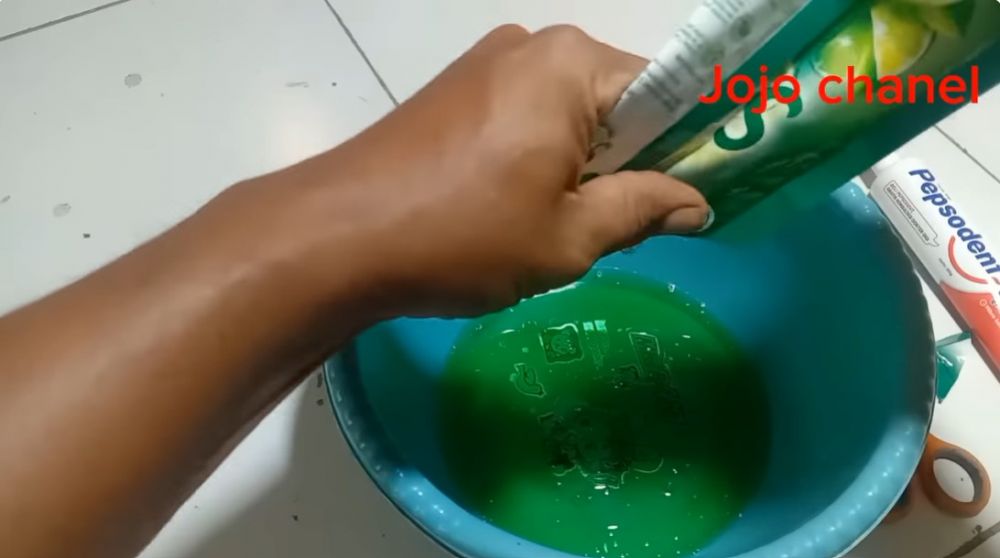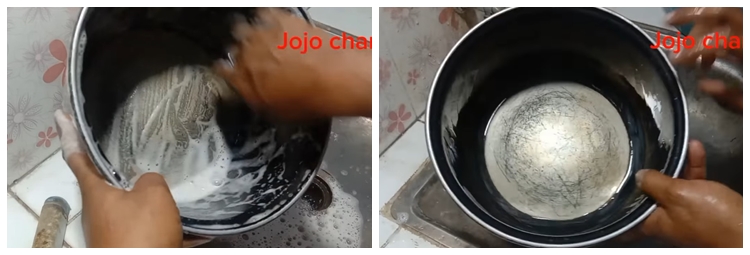Brilio.net - Dish washing soap is a very important household necessity. Its main function in cleaning various kitchen furniture means that the stock of this cleaning agent must always be fulfilled. Unfortunately, the high intensity of use means that laundry soap also runs out very quickly.
So to save more, many people mix dishwashing soap with water. Apart from that, there are also those who add salt to the mixture of water and dishwashing soap. This makes the texture of the dishwashing soap remain thick and foamy even when mixed with water.
However, please note that this mixture still reduces the cleaning power of dishwashing soap. So, to overcome this, there are other ingredients that need to be added. This material was used by YouTube user Jojo Channel through one of the uploaded videos.
Instead of salt, this netizen named Jojo added baking soda and toothpaste. Reported by BrilioFood on Monday (19/2), this mixture of ingredients can help increase the amount of dishwashing soap so that its cleaning power remains maximum. Apart from that, the texture of the soap is also thick and foamy when used.
How to increase the amount of dishwashing soap that is easy to practice.

photo: YouTube/Jojo channel
To do this, just prepare a basin. Then pour in 1 sachet of dishwashing soap measuring 210 ml. Then add 1 tablespoon of toothpaste and 600 ml of clean water. Lastly, also add 1 tablespoon of baking soda.

photo: YouTube/Jojo channel
Next, stir all these ingredients until evenly mixed. Then transfer it to a bottle or container large enough to hold it. So, this dishwashing soap mixed with toothpaste and baking soda can be used straight away.

photo: YouTube/Jojo channel
In the video, YouTube user Jojo Chanel uses this dishwashing soap to clean a crusty pan. When used for scrubbing, this soap can remove crust easily. This indicates that this trick of increasing dishwashing soap is very effective in cleaning cutlery and making you more economical.
"It turns out it doesn't reduce the quality of the washing soap, even though more water is added. But in fact the quality of the soap is actually really good," said YouTube Jojo channel.

photo: YouTube/Jojo channel
This post about tricks for increasing dish soap has been viewed more than 111 thousand times. It's not surprising that many other YouTube users are interested and also provide responses directly in the comments column. Most of these netizens admitted that this trick was very useful to practice.
"I just tried it earlier but it's very good, " said YouTube @Sakurachannel51.
"Very good and important knowledge, my brother. Thank you for sharing, my brother," said YouTube user @mbahgurutiono.
"Add salt...3 tablespoons...add shine," said YouTube @andigunawan1607.
"Very useful for science, thank you for sharing extraordinary techniques," said YouTube @SittiMusyrifah-fh5mo.
"Useful knowledge for mothers," explained YouTube @norfajri696.
If you experience irritation or sensitive skin due to using dishwashing soap, here are some tips for dealing with this problem.
One effective way to protect your hands from irritation is to use gloves when washing dishes. This will help prevent direct contact between the skin of your hands and the dish soap.
Choose dish soap that is specifically designed for sensitive hands or that contains a gentle formula. Avoid products that contain artificial fragrances, dyes, or harsh chemicals.
Check product labels carefully to identify ingredients that may irritate sensitive skin. Avoid dishwashing soap that contains aggressive ingredients.
After washing the dishes, apply moisturizer to your hands. Moisturizer helps maintain skin moisture and reduces the risk of dryness and irritation.
Consider using natural ingredients instead of conventional dish soap. For example, mix warm water with a little vinegar or baking soda to clean dishes without irritating your skin.
Avoid washing dishes with water that is too hot. Use warm or lukewarm water to reduce the risk of irritation and dryness of the skin.
After washing the dishes, soak your hands in olive oil or almond oil for a few minutes. This can help moisturize and soothe the skin.
Some antibacterial dish soaps contain chemicals such as triclosan which can cause skin irritation. Choose products without these additives.
Hypoallergenic products are often designed to reduce the risk of irritation to sensitive skin. Choose dishwashing soap that is labeled hypoallergenic.
When washing dishes, avoid scrubbing too hard or using too much soap. Wash gently to prevent skin irritation.
If sensitive or irritated skin remains a problem, you should consult a doctor or dermatologist for further advice or to prescribe products appropriate to your skin condition.
(brl/tin)